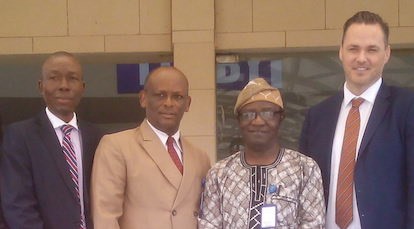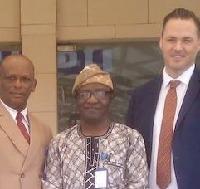James Lowry is a lecturer in the Liverpool University Centre for Archive Studies
A three hour drive from Lagos is the expansive campus of the University of Ibadan, home to the oldest archival education programme in Nigeria. It was here in 2017 that the Ibadan/Liverpool Digital Curation Curriculum Review team finalised their benchmarking exercise, which had started earlier that year when Dr Abiola Abioye visited the Liverpool University Centre for Archive Studies (LUCAS). Funded by the International Council on Archives, this collaboration was the latest in a long history of collaboration between the archives programmes at Ibadan and Liverpool dating back to the work of Professor Gabriel Alegbeleye and Dr Michael Cook in the 1990s.
 Our aim with this comparative curriculum review was to improve digital curation teaching in both programmes. To do that, we worked with Rosemary Lynch, a student at LUCAS, to identify a suitable framework that would help us benchmark our curricula. With advice from colleagues expert in digital curation, we settled on the DigCurV framework, which Rosemary worked up into a matrix of skills, knowledge and competency levels. To this, we added further parameters - ‘taught’, ‘practiced’ and ‘tested’ – so we could see if and where teaching was being reinforced and we were achieving what the educational theory literature calls ‘constructive alignment’.
Our aim with this comparative curriculum review was to improve digital curation teaching in both programmes. To do that, we worked with Rosemary Lynch, a student at LUCAS, to identify a suitable framework that would help us benchmark our curricula. With advice from colleagues expert in digital curation, we settled on the DigCurV framework, which Rosemary worked up into a matrix of skills, knowledge and competency levels. To this, we added further parameters - ‘taught’, ‘practiced’ and ‘tested’ – so we could see if and where teaching was being reinforced and we were achieving what the educational theory literature calls ‘constructive alignment’.
Using this tool, Abiola and I reviewed our module syllabi to find evidence of the teaching of the skills and knowledge set out in the DigCurV framework. This took a lot of checking, with the DigCurV documentation and with each other, to ensure that our understanding of concepts and terms was shared. Direct comparisons across the programmes depended on this. When in doubt that a skill statement was satisfied by our syllabi, we tended to be hard on ourselves, and the final results probably suggest that things are bleaker than they are, but we wanted to make sure we caught all the areas where improvements were possible.
We were also cognizant of the realities of teaching and professional practice in our respective environments. In Ibadan, internet access can be difficult, and often depends on the personal wifi of staff and students, computer labs are few and far between, but mobile telephony is ubiquitous. In Liverpool, we have computer labs and internet access, but only a few students have laptops and tablets, and access to software for teaching purposes relies heavily on freeware and favours from nearby records services or archives. When we were thinking about materials we could share or jointly develop, we had to be aware of these practicalities, but this helped us. We both wanted to prepare our students for work in ‘low resource environments’, whether a local government office in Kano or a community archive in London. How to do digital curation / preservation with almost no money? Graduates should know where to start, so we need to encourage inventiveness and critical thinking about principles in adverse situations before we send them out into the workforce. We bore this in mind when we compared our findings.
We found that there were a few areas where we could share teaching resources to help address deficiencies in our programmes. For instance, LUCAS was under-performing on teaching about data management and database design, but Ibadan had relevant course material that they could share. This material has been introduced into the Liverpool programme. Similarly, there was material on digital preservation that LUCAS could share with Ibadan. And there were areas where neither university was teaching adequately (user studies, and managing audit and certification, for instance), so these were identified as topics for which we could develop teaching resources together.
If we accept the argument that the digital heritage of one country or community is a part of the digital heritage of all humankind, there’s an imperative for us to learn and work together across borders. Both the University of Liverpool and the University of Ibadan have revised their teaching on the basis of our findings: these revisions will benefit the students of both programmes with a more thorough grounding in digital curation and preservation skills and knowledge. The project has made both courses more robust and will help to better prepare future generations of digital archivists and curators.

Read more...